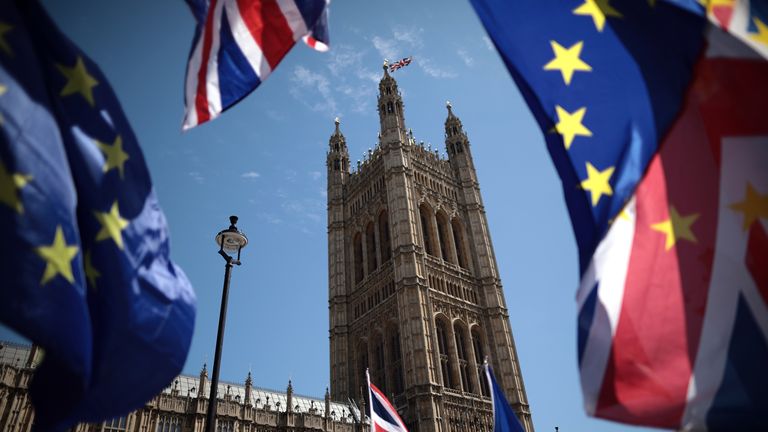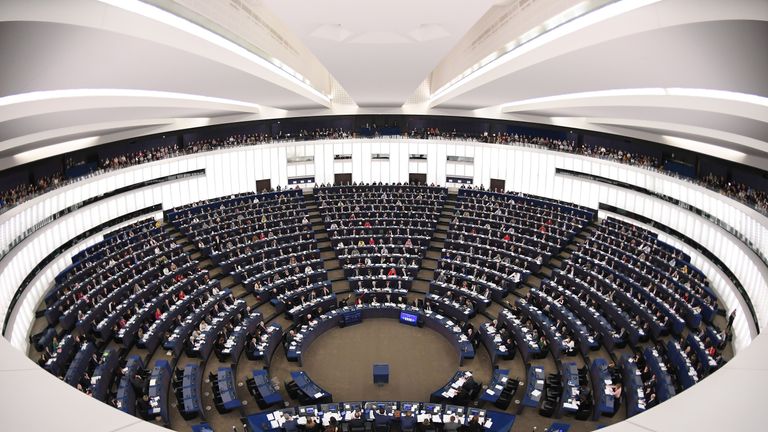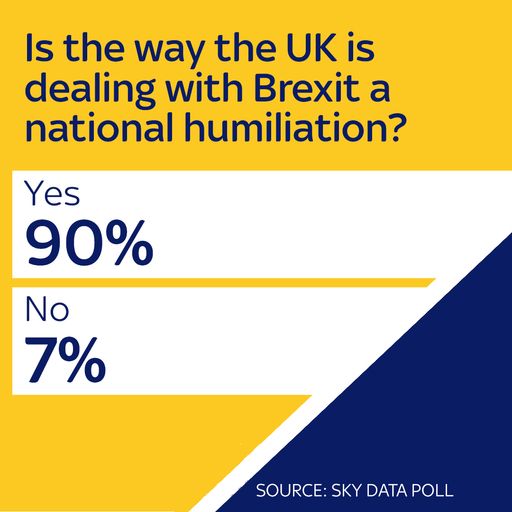Brexit - what happens next as Theresa May chases a three-month delay?
Will the PM finally pass her Brexit deal? Will MPs take control? Does the UK have to take part in EU elections?
Friday 22 March 2019 07:17, UK
The prime minister is requesting a three-month delay to Brexit from EU leaders.
The bloc will decide on her plea at a Brussels summit this week but - if they grant an extension to Article 50 or decline it - what happens next?
:: Monday 25 March
Mrs May has to lay a motion in the House of Commons setting out her next steps on Brexit, amid her continuing failure to secure the backing of MPs for a withdrawal agreement.
Like previous motions, MPs will try to attach a series of amendments to influence the Brexit process.
This is likely to include another attempt by MPs to seize control of parliamentary time from the government later in the week.
Labour's Yvette Cooper and former Conservative minister Nick Boles have previously spearheaded such efforts.
Should they be successful, this parliamentary time could be used to hold "indicative votes" on alternative Brexit outcomes, such as a second EU referendum, a Norway-style relationship, or permanent membership of the customs union.
:: Tuesday 26 March
The prime minister could bring her Brexit deal back to the Commons for another vote.
It has already been heavily defeated twice, but Mrs May might hope it is third time lucky with MPs facing the possible threat of a no-deal Brexit or a long delay to leaving the EU, if they don't vote for her withdrawal agreement.
However, the government has said it will only pursue a third vote if it looks likely to win.
And that, so far, doesn't seem plausible, with Labour, the DUP and some Tory Brexiteers all still opposed.
Commons Speaker John Bercow has also provided another stumbling block to a third vote, after he ruled the prime minister's proposal must be "substantially" different before it can be put before MPs again.
Mrs May believes EU approval for a short extension to the Article 50 negotiating period, as well as new legislative proposals to ease DUP concerns about the Brexit backstop, will convince Mr Bercow to allow a third vote.
If there is a vote, there is likely to be an amendment tabled to the prime minister's deal by two Labour backbenchers demanding a confirmatory referendum on her withdrawal agreement.
Labour leader Jeremy Corbyn has signalled he will order his MPs to back this amendment, as part of his party's promise to consider a fresh public vote.
:: Wednesday 27 March
If the prime minister's deal is voted down again, this could be the day MPs - if they've been successful earlier in the week - have set aside to seize control of parliamentary time to hold indicative votes.
However, even if there are indicative votes, there has so far been little sign of a majority of MPs uniting around any alternative Brexit outcome.
:: Thursday 28 March
If the prime minister has still failed to get her withdrawal agreement approved by MPs, this could prompt an emergency summit of EU leaders held in Brussels.
This could see EU leaders seek to avoid a no-deal Brexit by offering the UK a long extension to Article 50.
However, there have been suggestions from some within the bloc that such an extension would have to be conditional on holding a second EU referendum or Mrs May dropping her red lines for a future EU-UK trade relationship.
The EU might also authorise a longer extension if the prime minister signals she will call a general election.
:: Friday 29 March
The day the UK was originally meant to leave the EU.
Without an agreed extension to Article 50, under UK law this is still the default date for quitting the bloc.
In the absence of a withdrawal deal and no extension, this would be the date of a no-deal Brexit.
:: 11 April
This is the last date by which UK legislation has to be introduced in order for Britain to take part in European Parliament elections.
The EU has said, if Article 50 is to be extended beyond the end of May, the UK must elect MEPs to the Brussels and Strasbourg legislature.
:: 18 April
The last session of the European Parliament before elections. This could be the last time UK MEPs sit in the bloc's legislature. Or perhaps not.
:: 2 May
The date of local elections across England and Northern Ireland.
It has been speculated, if a general election is called, it could also be held on this date to coincide with the council ballots.
:: 23 May
The beginning of elections to European Parliament elections across the EU.
The bloc has said Brexit must be complete by this point if the UK is not to take part in the elections.
:: 30 June
The date Mrs May has asked for Article 50 to be extended to.
Some fear this date will now merely become the new "cliff-edge" ahead of a no-deal Brexit.
:: 31 December 2020
The end of the proposed Brexit transition period, at which point it is hoped the UK will move into a yet-to-be-negotiated new trading relationship with the EU.
The transition period will not be extended, even if the Article 50 period is prolonged.




